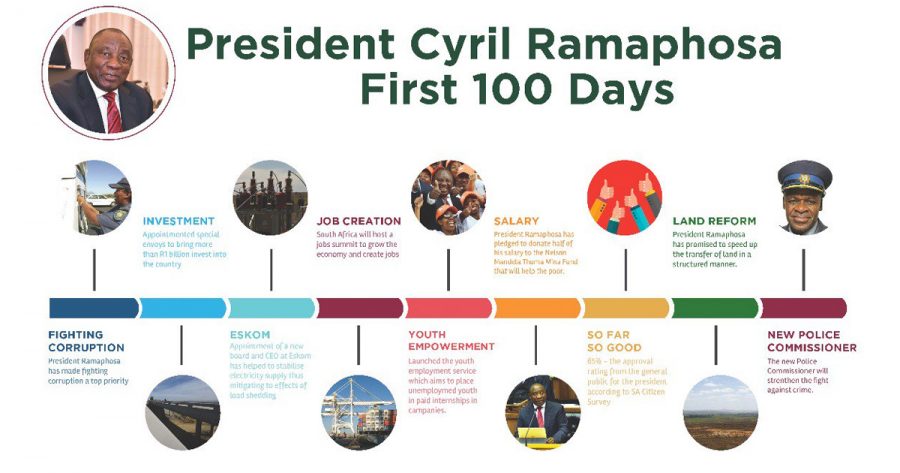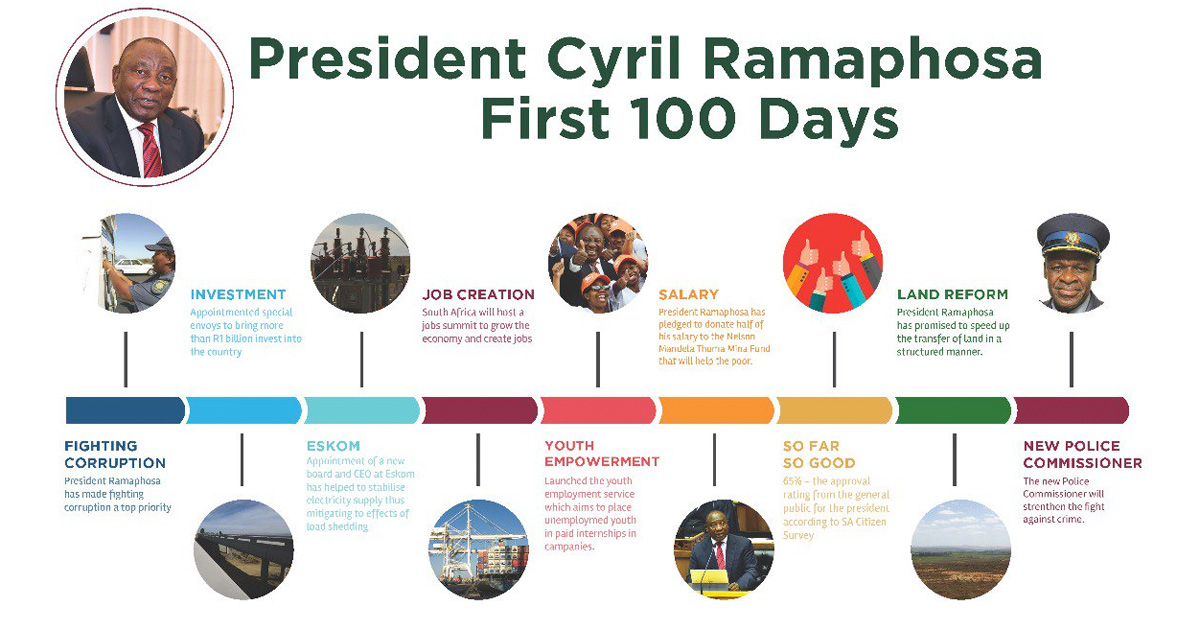
100 Days: What Has President Ramaphosa Done?
Saturday, 26 May, marks exactly 100 days since President Cyril Ramaphosa was elected into office. As he sees the end of his first one hundred days at the Union Buildings, the president’s score-card is a mixture of optimism in the future of the country – coupled with harsh economic realities, wage strikes, tax increases and […]

Saturday, 26 May, marks exactly 100 days since President Cyril Ramaphosa was elected into office.

As he sees the end of his first one hundred days at the Union Buildings, the president’s score-card is a mixture of optimism in the future of the country – coupled with harsh economic realities, wage strikes, tax increases and runaway food prices.
President Ramaphosa was sworn in as South Africa’s fifth democratically elected President since 1994 on 15 February during a week that was preceded by unprecedented political events which led to the postponement of the State of the Nation Address and the resignation of President Jacob Zuma.
Although President Ramaphosa, 66, took over government at a time the economy had not been doing very well with spiralling unemployment, many South Africans believe the president is steering the country in the right direction.
His approval rating of 65% is on par with that of his predecessors, Presidents Thabo Mbeki and Jacob Zuma at the 100-day mark. Both Mbeki and Zuma scored 66% and 68% respectively by the time they reached their 100th day in office.
The SA Citizens’ Survey (Sacs) on South Africans’ attitudes towards political leadership and the direction in which the country is moving had found that 65% of its respondents were satisfied with President Ramaphosa.
Sacs is conducted once a month by Citizen Surveys and is based on face-to-face interviews with a nationally representative sample of 1 300 respondents on topics including politics, economics, social issues and food security.
The survey found that 65% of respondents felt favourably inclined towards Ramaphosa in March, up from 57% in February.

Almost two thirds of respondents thought he was doing a good job.
Some analysts agree with these sentiments, adding that President Ramaphosa displayed his business acumen and listening skills in the face of economic pressures during his first 100 days in office.
“We think the President has moved quickly to address some of the low-hanging fruit that needed improvement, but the jury is still out on whether the President will have the necessary support to address the harder issues,” said University of Stellenbosch’s Bureau for Economic Research (BER) senior economist Hugo Pienaar.
But Pienaar said reform of the labour and education sectors are likely to be necessary in order for SA to achieve higher longer-term GDP growth rates.
“More also needs to be done to reduce the cost of doing business in SA,” he said.
Business Unity South Africa Chief Executive Tanya Cohen agreed, saying the election of President Ramaphosa had been a notable contributor to the revival of business and investor confidence in the country.
The Rand Merchant Bank/BER business confidence index (BCI) jumped by 11-index points from 34 in 2017 (fourth quarter) to 45 in 2018 (first quarter). The organisations described such a big increase between quarters as rare adding that since 1975, confidence increased by 11 index points or more, on only 15 occasions.
“The President’s inclusive approach, recognising the legitimate interests and contribution of all social partners, including business, will be key to South Africa’s economic revival, serving to unlock investment, economic growth and employment,” Cohen said.
President Ramaphosa’s most notable achievements
The most notable achievements of President Ramaphosa in his first 100 days in office have been his interventions at state-owned entities (SOEs) – like Eskom and SAA – where he has been seen as a new broom sweeping away years of corruption and maladministration.
He has also pushed through a new minimum wage, moved in to address challenges at South African Revenue Service and appointed investment envoys to bring in more than one trillion rand worth of investments to the country.
The interventions at SOEs comprised the finalisation of turn-around strategies with a specific focus on mandate positioning and market development, strengthening of corporate governance structures, and stabilising finances.
Eskom interventions prevented possible load-shedding
The Presidency said at Eskom, where President Ramaphosa put in place a new board, the interventions have had a direct impact in the stabilisation of electricity supply while mitigating the effects of load shedding.
The measures also included the appointment of the CEO and CFO, stabilisation of executive management and strengthening the board, while working with Public Enterprises and National Treasury to address some of the pressing funding shortfalls of the institution.
At SAA, a 90-day Action Plan was successfully implemented and new turn-around strategy developed and adopted by Cabinet in June 2015.
“Currently, government is in the process of finalising the appointment of a new board of directors as part of efforts to ensure good corporate governance,” said the Presidency.
The interventions were widely welcomed.
“Overall, we think the interventions have been positive and helped to improve both business and consumer confidence. Also of importance were the immediate actions to address the liquidity issues at Eskom by appointing a credible interim CEO and putting in place a new board.
“Indications of institutional renewal at other key state institutions, including SARS, have also been positively received as an indication of the President’s anti-corruption and open for business drive,” Pienaar said.
The Cabinet reshuffle, as well as the reconstitution of many of the boards of state owned enterprises was also seen by BUSA as signalling a new era of “ethical, accountable leadership and good governance”.
“This has translated into improvements in business confidence; strengthening of local currency; and more positive reviews by ratings agencies and international investors, as expressed during the International Investor Roadshow undertaken by Minister Nene in March this year,” the organisation said.
Jobs summit and youth
And soon after taking office, President Ramaphosa promised to convene a jobs summit within the next few months to align the efforts of every sector and every stakeholder behind the imperative of job creation.
The summit will look at what we need to do to ensure our economy grows and becomes more productive, that companies invest on a far greater scale, that workers are better equipped, and that our economic infrastructure is expanded.
Recently, he followed up on his promise to launch the youth employment service initiative, which will place unemployed youth in paid internships in companies across the economy. Some say the president has also moved to unite the nation around one common goal and patriotism through his “thuma mina” message.
Thorny issues
Like any President, Ramaphosa has already had his challenges – with land invasions, service delivery protests being the most notable.
One political analyst believes that the issue of land is one of the major thorny issues that President Ramaphosa will have to carefully manoeuvre through – and one that could define his presidency’s successes or failures.
“The land question is at the height of the political agenda and its resolution is urgent. How President Ramaphosa is seen to be leading or brokering a solution on this issue will be crucial,” said UKZN-based political analyst Lukhona Mnguni.
In his State of the Nation Address, President Ramaphosa had said he would be guided by the resolutions of the 54th National Conference of the governing party on the issue of land. Those resolutions included the approach that land would be expropriated without compensation.
“We are determined that expropriation without compensation should be implemented in a way that increases agricultural production, improves food security and ensures that the land is returned to those from whom it was taken under colonialism and apartheid,” President Ramaphosa said in February.
Significantly, Mnguni said going forward, President Ramaphosa’s movements in government are likely to be constantly limited by the internal dynamics within the governing party.
“The debate on land is very important for him going forward. But there are other issues that he would want to intervene on but his interventions unfortunately rely on the balance of power and internal consideration within the ANC,” he said.
Economically, Cohen said going forward, business would like to see the president maintain the focus on accountability and ethical leadership, building capacity within the State so as to implement stable, coherent, evidence based policies.
“This will provide the foundation to enable long-term sustainable and inclusive growth, employment and social development,” she said.
Pienaar said a public sector wage agreement that is contained around the projected CPI inflation rate will be important for the country’s fiscal position, as well as how the major credit rating agencies view South Africa.
The Mining Charter also needs to be finalised speedily and should preferably have buy-in from the major mining houses, he added. – SAnews.gov.za
